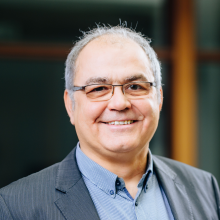
Projects from Prof. Dr.-Ing. J. Christoph Scheytt
Blind radar for visual impaired people
The aim of this project is to develop an innovative assistance system for visually impaired people. It uses a 120 GHz FMCW radar that detects obstacles that are outside the range of a conventional cane. To make use as intuitive as possible for users, the radar system is integrated into a handy device. A special lens ensures that only objects within ...
Duration: 01/2025 - 12/2025
Contact: Stephan Kruse, M.Sc.
Visible Light Sensing
Light-emitting diodes (LEDs) are increasingly being used as a primary light source both indoors and outdoors. In addition to their role as efficient lighting, LEDs also offer potential for new applications in sensor technology like visible light sensing (VLS) thanks to their high switching speed. VLS uses several terahertz (THz) of license-free ...
Duration: 01/2025 - 12/2025
Contact: Stephan Kruse, M.Sc.
SPP 2314; TP: MLL-basierte Integrierte THz Frequenz-Synthesizers (MINTS) Phase 2
Overarching goal of the project MINTS (phase 1 and 2) is to investigate and demonstrate electronic-photonic THz frequency synthesizer architectures, which conform to the requirements of integration in silicon photonics and Indium Phosphite (InP) photonic technology. Improvement in phase noise performance of the electronic-photonic THz synthesizers ...
Duration: 09/2024 - 08/2027
Contact: Meysam Bahmanian, Vijayalakshmi Surendranath Shroff, M.Sc.
LiDAR Radar Combi System
The main goal of the LiRaS-project is the integrated combination of a LiDAR and Radar system with a fine resolution, which is able to compete with moden high-resolution LiDAR systems by having an additional level of redundancy. The novel LiRaS system provides imaging, three-dimensional LiDAR and Radar data with a high signal-to-noise-ratio. ...
Duration: 05/2024 - 04/2027
Contact: Jan Brockmeier, M.Sc., Stephan Kruse, M.Sc.
PhoQS project: Modelling and Optimization of Photonic Wirebonds
High-quality photonic interconnects enable technological advances, both in optical data transmission and in quantum research projects. In this research project, optical broadband coupling methods will be investigated. A nano-precise 3D printer can be used to fabricate structures for photonic interfaces. Important work packages of this project ...
Duration: 09/2023 - 12/2024
Contact: Christian Kress, M.Sc., Martin Miroslavov Mihaylov, M.Sc.
PhoQS project: Quantum Assisted Sensor Systems
In this research project, a quantum-assisted lidar and photonic radar system will be built. For this purpose, a sensor transmit signal is modulated onto a CW laser signal, which is then transmitted directly (lidar) or after electro-optical conversion and an optional frequency multiplication (radar). In the case of photonic radar, the received ...
Duration: 07/2023 - 12/2024
Contact: Stephan Kruse, M.Sc.
PhoQS project: Quantum photonic systems in silicon nitride technology
In this research project, the feasibility of integration of quantum optic components, which are used in photonic quantum computers and sensors, in commercially available silicon nitride technology is investigated.Silicon nitride is widely used in highly integrated CMOS technologies and therefore, it allows mass production of photonic components ...
Duration: 07/2023 - 12/2024
Contact: Tobias Schwabe, M.Sc.
RadiOptics - EXIST Business Start-up Grant: RadiOptics
The goal of the RadiOptics project is to commercialize the next generation of microwave signal generators using a mode-locked laser (MLL). MLLs can generate a low-noise optical reference clock which have better precision in time unit measurement by orders of magnitude. The optical pulses of MLLs, however, cannot simply be used in a conventional ...
Duration: 06/2023 - 11/2024
Contact: Dr Peter Hertenstein
MID4automative: Mechatronic Integrated Devices for Automotive Radar Systems
Novel and innovative technologies like automated and autonomous driving will provide solutions to pressing global issues related to traffic. Autonomous cars will contribute by optimizing traffic flows, resulting in a more efficient use of energy resources and infrastructure. In addition, they ensure better traffic regulation, which results in fewer ...
Duration: 03/2023 - 02/2026
Contact: Stephan Kruse, M.Sc.
TRR 142 - Compact high performance photon pair source using ultrafast hybrid modulators based on CMOS and LNOI (C11*)
The project aims to study and demonstrate miniaturized sources of decorrelated photon pairs with high repetition rate. The goal will be achieved by jointly integrating high-bandwidth electro-optic modulators, and a specifically tailored parametric down-conversion (PDC) section, both in a lithium-niobate-on-insulator (LNOI) platform. To obtain ...
Duration: 01/2022 - 12/2025
Contact: Christian Kress, M.Sc.
